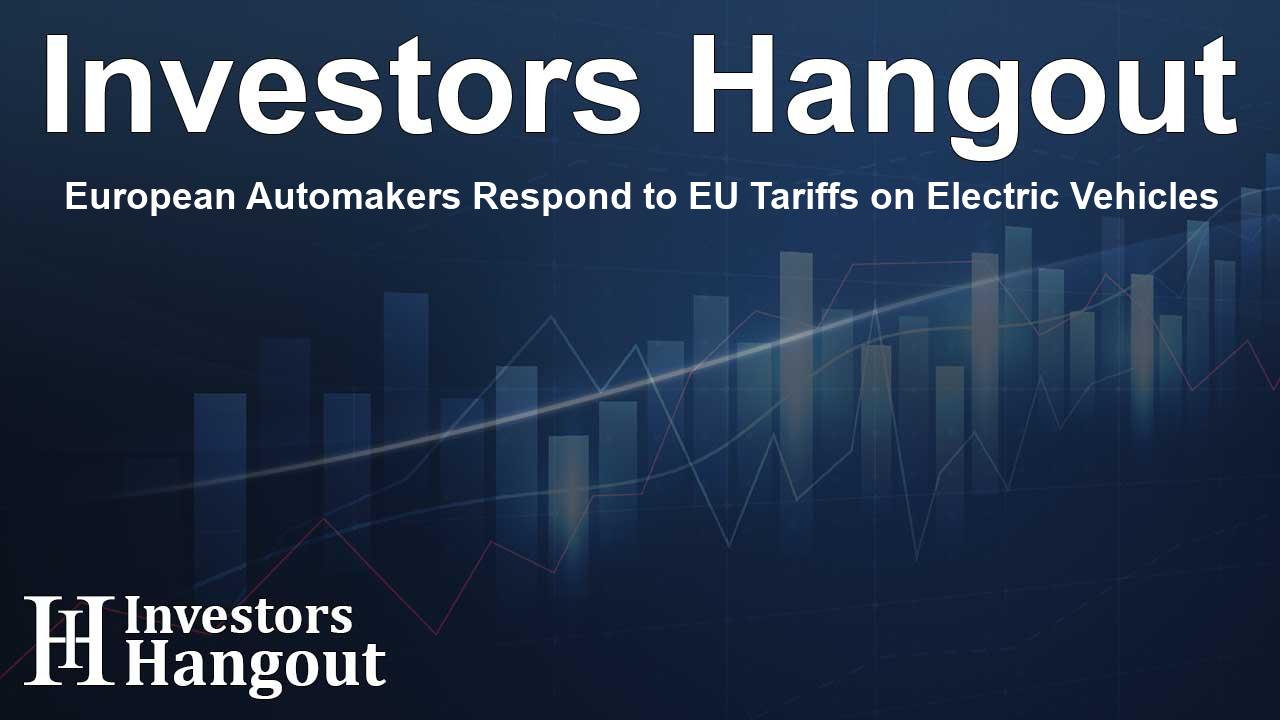European Automakers Respond to EU Tariffs on Electric Vehicles

European Automakers Respond to New EU Tariffs on Electric Vehicles
In a recent move that has sparked significant debate, European automakers have strongly criticized the European Union (EU) for introducing tariffs on Chinese electric vehicles (EVs). This decision has raised concerns among major automotive players about the long-term competitiveness of the European automotive industry.
Industry Leaders Speak Out Against Tariffs
Mercedes-Benz AG voiced its discontent, labeling the tariffs as a "mistake" and warning that such punitive measures could diminish the industry's global standing over time. Similarly, BMW AG echoed this sentiment, describing the tariffs as a "fatal sign" for Europe’s auto sector. This reaction underscores the apprehension among manufacturers about the potential adverse effects of these tariffs on their operations.
The Economic Impact on European Automakers
As the situation unfolds, European automakers have reacted with cautious optimism in the stock market. Following the announcement of the tariffs, shares of Mercedes-Benz and BMW saw an increase of 1.06% and 2.04%, respectively. This indicates that despite the negative implications of the tariffs, investor confidence in these companies remains relatively strong.
EU's Decision to Impose Tariffs
The EU has decided to implement tariffs as high as 45% on battery electric vehicles (BEVs) imported from China. This decision follows extensive discussions within the EU and highlights the bloc’s approach to protect its domestic automotive industry. The European Commission has emphasized that the goal is to ensure fair competition and address subsidization claims against Chinese manufacturers.
Response from the Automotive Sector
Key figures within the automotive sector have expressed their views on the EU’s actions. Nils Redeker, of the Jacques Delors Institute, stated that the tariffs reflect the EU's commitment to trade regulations and strategic decision-making. He suggested that these moves are necessary for safeguarding European interests in a competitive global market.
A Call for Dialogue Between the EU and China
In light of the new tariffs, the EU has expressed its intention to continue negotiations with China to address the ongoing trade tensions. The EU emphasizes that any resolution must be compliant with World Trade Organization (WTO) regulations and should effectively counteract the subsidization issues raised in its investigations.
The Position of EU Member States
Despite the EU's decision, member states remain divided on the tariff issue. While some countries like Spain have urged the EU to reconsider the tariff plans, others, including France, support them wholeheartedly. This division reveals the complex dynamics of trade relations within Europe, particularly regarding economic ties with China, which serve as a significant market for EU exports.
The Future of European Automakers
As the automotive industry navigates these challenges, manufacturers like Volvo have already adapted by committing to local production strategies. Volvo, owned by Geely Holdings of China, has expressed its dedication to investing in European operations to strengthen its presence in the region. This proactive approach is likely to be a common theme among European automakers as they face external pressures.
Potential Political Repercussions in Germany
The issue of tariffs may have political ramifications for Germany’s Chancellor Olaf Scholz. With a recent electoral victory fresh on his mind, Scholz's administration is under scrutiny for how it handles trade relations and tariff policies. Critics argue that succumbing to lobby pressure from Beijing could have detrimental effects on Germany's broader industrial interests, highlighting a critical moment in the nation’s trade policy.
Frequently Asked Questions
What are the new tariffs imposed by the EU?
The EU has introduced tariffs as high as 45% on battery electric vehicles imported from China.
How have European automakers reacted to these tariffs?
Major automakers like Mercedes-Benz and BMW have criticized the tariffs, stating that they could harm the industry's global competitiveness.
What measures is the EU taking in response to these tensions?
The EU is engaging in discussions with China to address trade compatibility and subsidization issues, aiming for a constructive resolution.
Which countries support the EU's decision on tariffs?
While some EU member states like France support the tariffs, others such as Spain have called for reconsideration, highlighting a divide in opinion.
How might tariffs impact politics in Germany?
Political repercussions may follow for Chancellor Olaf Scholz if the tariffs adversely affect Germany's industry, leading to increased scrutiny of his administration's trade policies.
About Investors Hangout
Investors Hangout is a leading online stock forum for financial discussion and learning, offering a wide range of free tools and resources. It draws in traders of all levels, who exchange market knowledge, investigate trading tactics, and keep an eye on industry developments in real time. Featuring financial articles, stock message boards, quotes, charts, company profiles, and live news updates. Through cooperative learning and a wealth of informational resources, it helps users from novices creating their first portfolios to experts honing their techniques. Join Investors Hangout today: https://investorshangout.com/
Disclaimer: The content of this article is solely for general informational purposes only; it does not represent legal, financial, or investment advice. Investors Hangout does not offer financial advice; the author is not a licensed financial advisor. Consult a qualified advisor before making any financial or investment decisions based on this article. The author's interpretation of publicly available data shapes the opinions presented here; as a result, they should not be taken as advice to purchase, sell, or hold any securities mentioned or any other investments. The author does not guarantee the accuracy, completeness, or timeliness of any material, providing it "as is." Information and market conditions may change; past performance is not indicative of future outcomes. If any of the material offered here is inaccurate, please contact us for corrections.